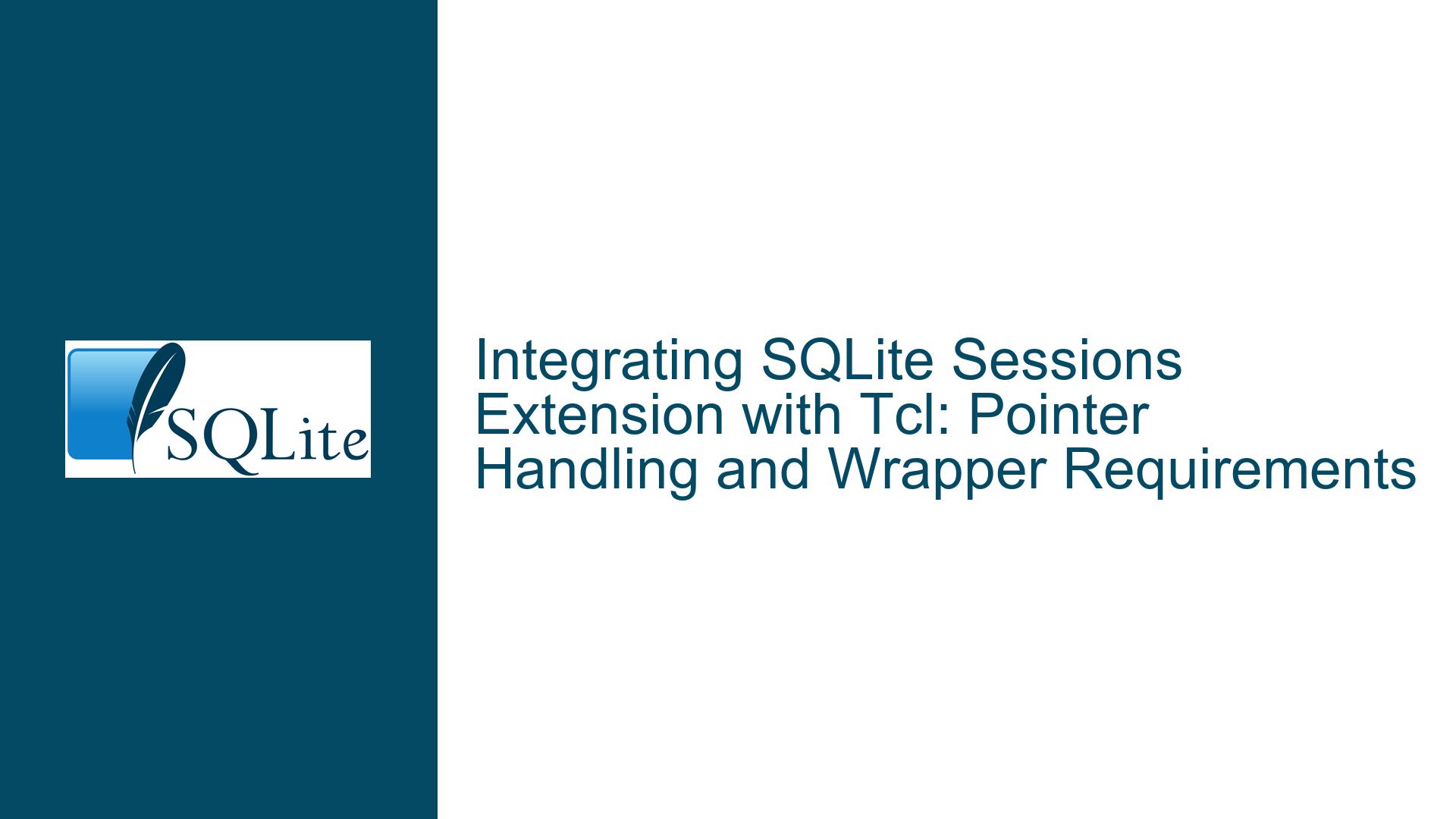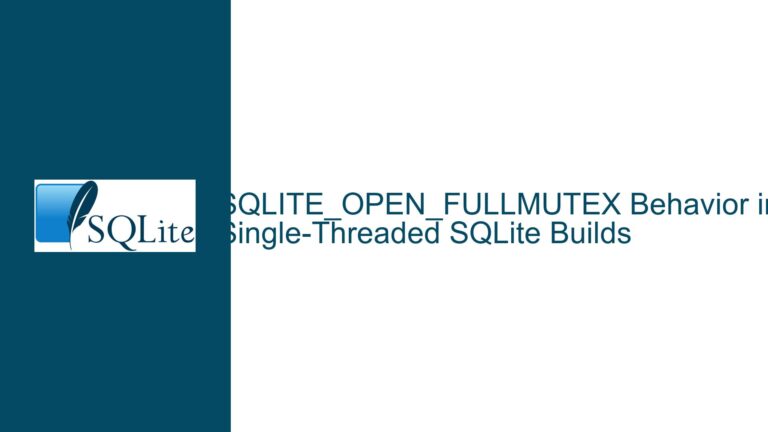Integrating SQLite Sessions Extension with Tcl: Pointer Handling and Wrapper Requirements
Bridging the Gap Between SQLite Sessions C API and Tcl’s Pointer-Limited Environment
Issue Overview: Tcl’s Lack of Native Pointer Support for SQLite Sessions Extension Integration
The SQLite Sessions extension provides a mechanism for tracking changes to a database, enabling features like incremental data synchronization and conflict resolution. It is implemented as a C-language API that relies heavily on pointer-based arguments to manage session objects, configuration settings, and data buffers. Tcl, however, is a high-level scripting language that abstracts away low-level memory management and does not natively support direct pointer manipulation. This creates a fundamental incompatibility when attempting to invoke Sessions extension functions directly from Tcl scripts.
The Sessions extension’s C API includes functions such as sqlite3session_create(), sqlite3session_attach(), and sqlite3session_diff(), all of which require pointers to session objects, database handles, or buffer structures. For example, sqlite3session_create() expects a pointer to an sqlite3* database handle and a pointer to an sqlite3_session** output variable to initialize a session object. In Tcl, variables are not memory addresses, and there is no built-in syntax or data type to represent or dereference pointers. Consequently, attempting to call these functions directly from Tcl results in type mismatches and runtime errors.
The absence of a pre-existing Tcl wrapper for the Sessions extension exacerbates the problem. Wrapper code acts as an intermediary layer that translates Tcl script commands into C function calls, marshaling data between Tcl’s string-based variables and C’s pointer-centric API. Without such a wrapper, developers must either write custom glue code or abandon efforts to integrate the Sessions extension with Tcl. The SQLite development team’s internal test code for the Sessions extension (referenced in the discussion) demonstrates a minimal wrapper but is not designed for production use or public consumption. This leaves Tcl developers with limited guidance on how to proceed.
Possible Causes: Pointer Abstraction Mismatches and Missing Middleware
The core challenge stems from three interrelated factors:
Tcl’s Design Philosophy and Memory Safety: Tcl intentionally avoids exposing raw pointers to script authors to prevent memory corruption, dangling references, and other low-level errors. Variables in Tcl are string-based or hold high-level objects like lists or dictionaries. While this design enhances safety and simplicity, it creates a barrier when interfacing with C libraries that demand direct memory access.
SQLite Sessions’ C-Centric Architecture: The Sessions extension is optimized for integration into C/C++ applications. Its API functions expect pointers to opaque structures (e.g.,
sqlite3_session*), which are meaningless in Tcl’s execution environment. Even if a Tcl script could somehow obtain a pointer value (e.g., as an integer), Tcl lacks the mechanisms to dereference or manage the underlying memory.Absence of Community-Maintained Bindings: Unlike other SQLite features (e.g., the core SQL engine or virtual tables), the Sessions extension has not garnered widespread adoption in the Tcl ecosystem. Consequently, no mature, community-supported Tcl packages exist to bridge the gap. Developers must either adapt the SQLite team’s internal test code or build a custom solution from scratch.
A secondary issue is the complexity of the Sessions API itself. Beyond basic session creation and destruction, functions like sqlite3session_changeset() require handling binary large objects (BLOBs) representing changesets. Translating these BLOBs between C buffers and Tcl’s string-oriented data types introduces additional challenges, such as encoding/decoding and memory lifetime management.
Troubleshooting Steps, Solutions & Fixes: Building a Custom Tcl Wrapper for SQLite Sessions
Step 1: Establish a Foundation with Tcl’s C Extension API
Tcl provides a C API for creating custom extensions. This API allows developers to define new Tcl commands in C, which can then be invoked from Tcl scripts. The process involves:
- Creating a C Function for Each Sessions API Operation: For example, a
::sqlite3session_createTcl command would map to the Csqlite3session_create()function. The C function must parse Tcl script arguments, convert them to C data types, invoke the Sessions API, and return results as Tcl variables. - Mapping Pointers to Opaque Handles: Since Tcl cannot directly manipulate pointers, session objects (
sqlite3_session*) and changeset buffers (void*) must be represented as opaque handles. These handles can be stored as integers or strings in Tcl variables, with the C wrapper responsible for mapping them back to actual pointers.
A minimal example for session creation:
#include <tcl.h>
#include <sqlite3.h>
#include <sqlite3session.h>
static int Tcl_SessionCreateCmd(ClientData clientData, Tcl_Interp *interp, int objc, Tcl_Obj *const objv[]) {
sqlite3 *db;
sqlite3_session *pSession;
int rc;
// Parse Tcl arguments: database handle (as string), session handle variable name
const char *dbHandleStr = Tcl_GetString(objv[1]);
sscanf(dbHandleStr, "%p", &db); // Extract sqlite3* from string representation
rc = sqlite3session_create(db, "main", &pSession);
if (rc != SQLITE_OK) {
Tcl_SetResult(interp, (char *)sqlite3_errstr(rc), TCL_STATIC);
return TCL_ERROR;
}
// Store session pointer as a string in Tcl variable
char sessionHandleStr[20];
sprintf(sessionHandleStr, "%p", pSession);
Tcl_Obj *resultObj = Tcl_NewStringObj(sessionHandleStr, -1);
Tcl_SetVar2Ex(interp, Tcl_GetString(objv[2]), NULL, resultObj, TCL_LEAVE_ERR_MSG);
return TCL_OK;
}
This code snippet defines a Tcl command Tcl_SessionCreateCmd that accepts a database handle (as a string) and a variable name to store the session handle. The sqlite3* pointer is reconstructed from its string representation, and the new sqlite3_session* pointer is formatted as a string for Tcl.
Step 2: Handle Pointer Lifetime and Memory Management
Opaque handles in Tcl scripts do not automatically manage the lifetime of the underlying C objects. Developers must ensure that sessions are properly deleted using sqlite3session_delete() when no longer needed. This requires implementing a companion ::sqlite3session_delete Tcl command:
static int Tcl_SessionDeleteCmd(ClientData clientData, Tcl_Interp *interp, int objc, Tcl_Obj *const objv[]) {
sqlite3_session *pSession;
const char *sessionHandleStr = Tcl_GetString(objv[1]);
sscanf(sessionHandleStr, "%p", &pSession);
sqlite3session_delete(pSession);
Tcl_SetResult(interp, "OK", TCL_STATIC);
return TCL_OK;
}
To prevent memory leaks, Tcl scripts must explicitly call this command when a session is no longer required. Alternatively, the wrapper could register session pointers in a global registry and implement a Tcl finalization callback to auto-delete sessions on interpreter shutdown.
Step 3: Marshal Complex Data Types Between C and Tcl
The Sessions extension’s sqlite3session_changeset() function outputs a changeset as a void* buffer with an associated length. To expose this in Tcl, the wrapper must copy the buffer contents into a Tcl byte array object:
static int Tcl_SessionChangesetCmd(ClientData clientData, Tcl_Interp *interp, int objc, Tcl_Obj *const objv[]) {
sqlite3_session *pSession;
const char *sessionHandleStr = Tcl_GetString(objv[1]);
sscanf(sessionHandleStr, "%p", &pSession);
int nChangeset;
void *pChangeset;
int rc = sqlite3session_changeset(pSession, &nChangeset, &pChangeset);
if (rc != SQLITE_OK) {
Tcl_SetResult(interp, (char *)sqlite3_errstr(rc), TCL_STATIC);
return TCL_ERROR;
}
Tcl_SetObjResult(interp, Tcl_NewByteArrayObj(pChangeset, nChangeset));
sqlite3_free(pChangeset); // Ensure C-layer memory is freed
return TCL_OK;
}
This command returns the changeset as a Tcl byte array, which can be processed with Tcl’s binary string commands or passed to other extensions.
Step 4: Adapt SQLite’s Test Code for Production Use
The SQLite team’s test code (linked in the discussion) provides a starting point but lacks error handling, memory safety, and Tcl idiomatic conventions. Key adaptations include:
- Adding Argument Validation: Ensure Tcl commands check the number and types of arguments before proceeding.
- Implementing Error Messages: Convert SQLite error codes into human-readable Tcl errors.
- Exposing Configuration Options: Wrap functions like
sqlite3session_config()to allow Tcl scripts to set session options.
For example, the test code’s test_session_filter function can be repurposed into a ::sqlite3session_filter Tcl command that configures a session’s table filter.
Step 5: Evaluate Alternatives to Custom Wrapper Development
If building a custom wrapper is impractical, consider these alternatives:
- Use a Different Language Binding: If the project allows, switch to a language like Python (with
pysqlite) or C++ that has existing Sessions extension bindings. - Leverage Tcl’s FFI Tools: Tools like
critclorffidlenable calling C functions directly from Tcl scripts without writing a full extension. However, these still require careful handling of pointers and data types. - Emulate Sessions in Pure Tcl: Reimplement a subset of Sessions extension functionality by monitoring changes via triggers and logging them to shadow tables. While less efficient, this avoids C integration entirely.
Final Considerations for a Robust Implementation
- Thread Safety: Ensure the wrapper handles cases where Tcl interpreters are used in multi-threaded environments.
- Binary Distribution: Package the wrapper as a loadable Tcl module (
.soor.dll) for easy deployment. - Testing: Validate the wrapper against SQLite’s session test cases to ensure compatibility.
By systematically addressing pointer handling, data marshaling, and error management, developers can successfully integrate the SQLite Sessions extension into Tcl applications, albeit with significant upfront effort. The result is a seamless interface that combines Tcl’s scripting flexibility with the Sessions extension’s powerful change-tracking capabilities.






